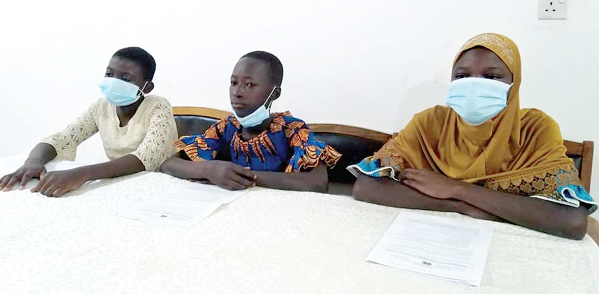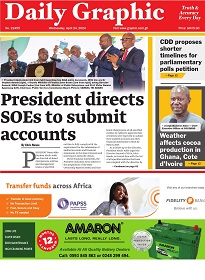Ghana News | Ghana Politics | Breaking News in Ghana

Tackle challenges facing adolescents - Government advised
Some adolescent girls from six districts in the Upper East Region have called on the government to take steps to address sexual and reproductive health rights challenges they face to enable them realise their full potential.
The girls, who are from the Bawku West, Kassena-Nankana West, Bongo, Builsa South, Nabdam and Talensi districts, said the measure would also empower them as adolescents to make informed decisions regarding their sexual and reproductive health rights.
Advertisement
The government’s intervention, they said, would further help curb the incessant increase in teenage pregnancies and child marriage cases in the region and the country as a whole.
Ms Esther Bugre, a 13-year-old pupil of the Presentation Junior High School in the Nabdam District, made the call at a media briefing in Bolgatanga last Friday on behalf of her colleagues numbering about 30,000 in the six districts.
The adolescents, aged between 12 and 19, drawn from various Adolescent Health Clubs in the beneficiary districts, were involved in a project which sought to advocate for the creation of an enabling and protective environment for adolescents and gatekeepers to champion sexual and reproductive health rights in the region.
The project was facilitated by the Rural Initiatives for Self-Empowerment Ghana (RISE-Ghana), an advocacy Non-Governmental Organisation (NGO) and funded by the United Nations Children’s Fund (UNICEF).
Challenges
Ms Bugre noted that teenage pregnancy, defilement, poor nutrition, child neglect and exploitation were hindering the progress of adolescents and urged the government to help address them.
She said sexual and reproductive health rights were critical to the development of adolescents and asked the government, as well as policy makers, to involve more youth in decision-making on issues that affected them.
Ms Bugre further entreated the government to establish changing rooms in schools to enable menstruating girls feel safe and comfortable whenever they are in that period of the month.
She appealed to the government to waive taxes on sanitary pads to make it cheaper and affordable for girls to purchase.
She observed that when sexual and reproductive health issues were addressed, girls would be able to acquire the needed education to contribute to gender equality and the attainment of the Sustainable Development Goals (SDGs).
Teenage pregnancies
The Head of Programmes of RISE-Ghana, Ms Jaw-haratu Amadu, noted that the region was still bedeviled with teenage pregnancies, adding that statistics from the Ghana Health Service (GHS) revealed that the region recorded 6,533 cases in 2020 and 1,639 cases in the first quarter of 2021.
She blamed the situation on the lack of access to sexual and reproductive health education to enable adolescents make right choices regarding their sex lives.
“Adolescent girls in Ghana are unable to harness their full potential and realise their dreams due to a myriad of factors ranging from teenage pregnancy, limited access to comprehensive sexuality information and services, negative masculinity norms, sex taboos, gender norms among others,” Ms Amadu noted.
She said the project, was among other things, aimed at identifying, mobilising and empowering gatekeepers, service providers and duty bearers to create protective and conducive environment for improved access to quality, age-appropriate comprehensive sexuality education and reproductive health services.




